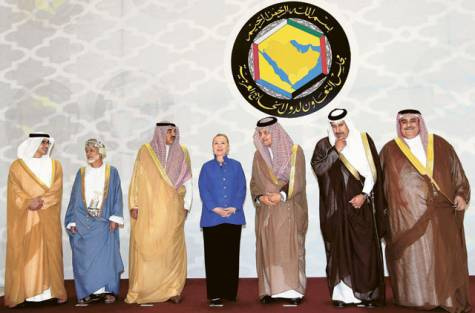Editorial
Another US Adventure in the Persian Gulf

U.S. Secretary of State Hillary Clinton was in the Persian Gulf region last week and, as expected, Iranophobia was at the top of her agenda again. Although the stated aim of her visit was to attend the first meeting of the U.S.-GCC Strategic Cooperation Forum in Riyadh, Clinton also met with King Abdullah of Saudi Arabia and the main topics of discussion included regional military strategy as well as Iran and Syria.
The Forum was first proposed by the U.S. administration last fall to put existing U.S. defense cooperation with individual Persian Gulf countries into a strategic context with the GCC as a whole. During the Riyadh meeting, Clinton said U.S. commitment to the Persian Gulf is "rock-solid and unwavering", claiming that U.S. and GCC countries share concerns about Iran's nuclear program. She then called for improved collaboration with these countries on maritime security and missile defense and said that both sides should take "practical steps to strengthen mutual security".
The principal argument raised by Americans is that ballistic threat from Iran is expanding, hence the need to build a "regional missile defense architecture" in the area which is part of the overall Pentagon plan to deploy its global antiballistic missile defense system in Asia and the Middle East.
The new U.S. strategy has been sharply criticized by Iran. The head of the foreign policy commission of the Iranian parliament, while arguing that the U.S. has been cheating regional countries with Iranophobia to sell them American weapons, said, "Iran never accepts foreigners interfering in the region." Furthermore, Iran's defense minister said, "The missile defense shield in the Persian Gulf is an American-Israeli move, and we advise our friends not to enter these fields."
The U.S. has for many years had defense and diplomatic negotiations with the Persian Gulf countries, but this is the first time the U.S. is promoting the missile-defense plan for this region. The raison d'etre behind the new American move includes the following: to sell more advanced weaponry to the GCC countries, to put more pressure on Iran, particularly before the next round of nuclear talks, and to secure long-term and steady flow of oil to the West as the U.S. tries to curtail the sale of Iranian oil to the world market.
However, the U.S. is facing certain difficulties in the implementation of the new plan. The GCC has never been a coherent organization. It was established during the early days of the Iran-Iraq War in the 80's to create a common front against the two big neighbors. As the biggest country within the GCC, Saudi Arabia has constantly dominated the organization and has never allowed it to be sidelined in any decision the GCC makes. Moreover, internal strife, which has at times gotten out of hand and even reached the level of military conflict such as the one between Bahrain and Qatar in the early 90's, has threatened the very survival of GCC. The Al-Jazeera TV network, based in Doha and funded by Qatar, has on many occasions irritated other GCC members particularly Saudi Arabia and Bahrain that consider the network as working against them.
The U.S. strategy of promoting Iranophobia will not bear fruit in the long run and will further damage the country’s image in the eyes of the people in the region. The interests of littoral states of the Persian Gulf are served through inclusion, dialogue and understanding. These countries should realize the fact that the United States is looking after its own interests and not those of the peoples in the region. The establishment of security in the region through regional arrangement, such as the one provided by Security Council Resolution 598, can best protect the region from any threat.

